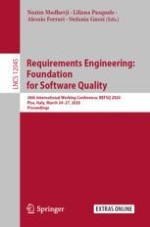2020 | OriginalPaper | Buchkapitel
On Understanding How Developers Perceive and Interpret Privacy Requirements Research Preview
verfasst von : Mariana Peixoto, Dayse Ferreira, Mateus Cavalcanti, Carla Silva, Jéssyka Vilela, João Araújo, Tony Gorschek
Erschienen in: Requirements Engineering: Foundation for Software Quality
Aktivieren Sie unsere intelligente Suche, um passende Fachinhalte oder Patente zu finden.
Wählen Sie Textabschnitte aus um mit Künstlicher Intelligenz passenden Patente zu finden. powered by
Markieren Sie Textabschnitte, um KI-gestützt weitere passende Inhalte zu finden. powered by
